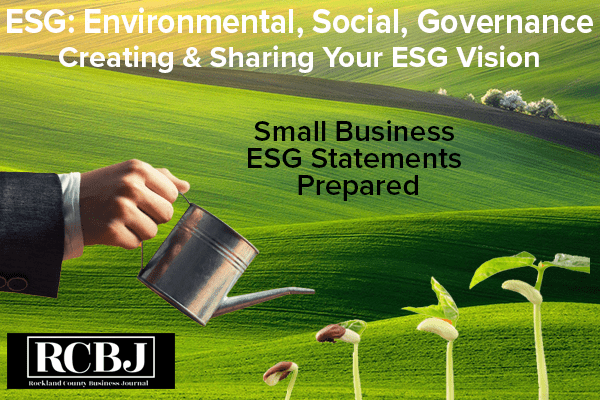Environmental, social, and governance (ESG) is a tool that businesses use to report their environmental, social, and governance policies and impacts. Usually undertaken by public companies to be more transparent about investment risks and opportunities, more and more small businesses are preparing and broadcasting their own commitments to these issues to obtain a competitive advantage over companies that don’t recognize the need to report.
ESG is “changing the landscape in labor and employment law.”
Companies applying for tax abatements, grants, or other public funding likely need to answer to the planning and zoning boards, industrial development agencies, local development corporations, and the public. Not only is it good PR to broadcast a company’s commitment to public good, ESG reporting may also help attract better employees, partners, investors, and the like, or to smooth opposition to pending projects. Millennial job hunters, consumers, vendors and investors value ESG and may bypass a company that doesn’t.
In fact, some banks are teaming up with housing developers and earmarking loan portfolios toward developers who adhere to measurable ESG principles.
What is ESG? | Understanding each component of ESG
(E) Environmental. What is the company doing about its interaction with the environment? Is it working to reduce its carbon footprint? What measures are being used to go green? Where does it source its building supplies? Are its projects LEED certified? What percentage of its trash is recycled? How does it manage its energy usage?
(S) Social. How is the company dealing with people…employees, customers, suppliers? Does it provide educational subsidies to employees? Complete benefits? What is the company doing for the community? Are its plans in accordance with municipal master plans? Do its employees participate in charitable undertakings?
(G) Governance. Is there sound leadership for the company? Are there plans for the future to improve deficiencies? Are there controls (e.g., audits) to ensure things are being handled correctly? What does the governing board look like? What about next level management? Is it diverse and inclusive? Does it support equal pay for equal work?
These are just some examples. There are many, many more depending on the type of industry you are in, your location, and your mission.
Why is ESG important?
It’s been reported that ESG is “changing the landscape in labor and employment law.” These changes impact small employers who aren’t subject to ESG reporting but should probably consider ESG factors in their operations. Some examples:
Environmental. Allowing employees to work from home so they don’t need to commute is a plus for the environment. Using best practices for waste management and pollution control is an important green action. How it chooses its energy suppliers matters.
Social. Diversity, equity, and inclusion in the workplace as well as favorable working conditions lead to a happier workforce. Also helpful for employees are training and education. For customers, consider consumer protection and fair-trade practices.
Governance. Self-monitoring of company actions and reporting this to stakeholders (e.g., employees) also helps with employee recruitment and retention. Charitable donations and community participation demonstrate a company’s involvement beyond its walls.
Final thought
While you don’t have to generate a fancy ESG report, you can review company policies to see that they align with ones favored by the marketplace and are just good things to do. Every company and business can benefit from ESG reporting. Not reporting will likely put you at a competitive disadvantage.
For more information, or to discuss launching your ESG platform, give us a call or fill out the form below and we will contact you.













